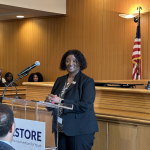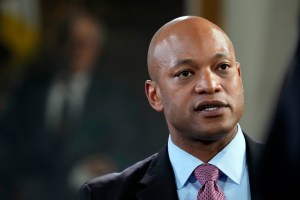By Ryan Michaels
The Birmingham Times
A new juvenile detention reentry program was launched Wednesday in Birmingham to provide comprehensive services and support for youth ages 16 to 19 who have been placed in state custody for a minimum of 30 days, according to the city.
The program was announced inside the Jefferson County Family Court, attended by Mayor Randall Woodfin; Jefferson County Family Court Presiding Judge Janine Hunt-Hilliard; and Jefferson County District Attorney Danny Carr, social workers and a room full of family court personnel.
The RESTORE (reduce, educate, support, train, organize, realize, empower) program will provide counseling, social skills, career readiness, financial literacy and technology programs to youth and their families, in addition to a host of housing, employment and other stabilization opportunities through community partners.
Dealing with crime requires multiple “tools,” and law enforcement is only one, said Mayor Randall Woodfin, adding that RESTORE can help address the other parts of stopping crime.
“You need a minimum of two other tools in his toolbox, and that includes reentry efforts, as well as prevention efforts, and I believe this program we’re talking about today allows us to engage in a hybrid approach,” the mayor said.
In 2022, 69% of youth aged 13 to 22 who were murdered had prior family court contact, according to the mayor. Also, 83% of youth under 22 who were charged with murder or attempted murder also had prior family court contact, he said.
Hunt-Hilliard said the RESTORE program is “essential” because of its ability to work with whoever the youth’s custodians are, whether that be the birth parents, grandparents or a close family friend.
“While [a child is] away, being rehabilitated, we’re working with the family to make sure that when they return, they have the greatest chance of success. This is what the RESTORE program is all about,” Hunt-Hilliard said.
Building up the family ensures the greatest likelihood of success for children, Hunt-Hilliard said.
“All we want for our children is to see them be successful, to be productive members of our society, and each of them has the ability to do so. We just have to give them a little bit more help,” she added.
She added that many of the youth do well in custody but “backslide” when they leave and return to their home environments.
“When we think about why … it’s clear that it’s partially because [the youth are] placed right back into the same environment they came from, with the same triggers, with the same negative influences and with the same challenges that they [continually] face.”
The RESTORE program is expected to serve 120 juveniles, the maximum number for the pilot, over a 12-month period. The selection criteria include 10 requirements.
Carrie Buntain, executive director of the JCFRC, said a seven-member selection committee, which includes herself, as well as two coordinators with the RESTORE program, two liaisons from G. Ross Bell detention center, a mental health provider and a substance abuse treatment provider, will select juveniles for the program.
Buntain said the committee would seek to “figure out which families can benefit the most out of this, not just the child that’s in front of us, but the whole family.”
The program is designed to provide multiple services and support including:
–Comprehensive family intake and assessment
–Intense strength-based case management
–Benefits assessment
–Pay for essential documents such as State ID
–Creation of a participant educational/career plan
–Transportation for participants
–Provision of work/training equipment, clothing, testing/certification/licensure costs
–Work with families to ensure safe housing and stability
–Advocacy, systems navigation and community-based services
RESTORE, which is receiving $225,000 from the city of Birmingham, is one of a number of city-funded projects intended to target crime.
Millions have been given out by the city to other programs including the Common Ground HEAT curriculum in Birmingham City Schools, a hospital-linked violence intervention program for surviving victims of gun violence and a safe haven program at city recreation centers, among others.











